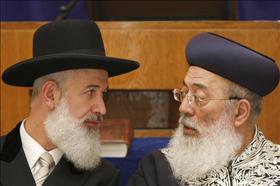Chief Rabbinate demonizes non-Orthodox
Does Israel Need A Chief Rabbi?
The overwhelming majority of Israelis want to see its founding promises of "freedom of religion and conscience" and "equality regardless of religion" fully realized. The Chief Rabbinate of Israel, through is preventing that from happening.
Uri Regev 25/09/2012 14:37
Tags:

Chief Rabbis, Shlomo Amar and Yona Metzger at the Yeshurun synagogue in Jerusalem. 18.07.2009. Photography: Abir Sultan, Flash 90
It’s time to say out loud that which Israeli politicians would not utter: the Chief Sephardic Rabbi, Shlomo Amar, is a threat to both the Jewish People and the State of Israel.
In a Rosh Hashana interview, Rabbi Amar chose to focus on battling Reform Judaism. He stressed that one should "not participate in High Holy Day services at all, rather than pray with Reform." For one who demands to be acknowledged as Israel’s highest Jewish authority, such a pronouncement puts both Rabbi Amar and Israel on a collision course with world Jewry. Prime Minister Netanyahu surely knows that most of Israel’s supporters in AIPAC, the Jewish Federations, the American Jewish Committee, the Anti-Defamation League, etc., attend High Holiday Services in Reform and Conservative synagogues. Yet Israel’s political leadership held their silence. And it's not the first time.
Just a few months ago when, a Supreme Court ruling ordered the State of Israel to recognize Reform and Conservative rabbis serving in rural communities. The Chief Rabbis declared a war against the court ruling, demonizing Reform Judaism as "destroyers, terrorists, God’s enemies, evil" and worse. And Israel's leaders were silent then, too.
Rabbi Amar's battle against non-Orthodox Jewry should be seen in a wider context; he clearly identifies with the ultra-Orthodox anti-Zionist interpretation of Judaism, expressed by strident rejection of the modern State of Israel, its laws and its judiciary. According to Rabbi Amar, Israel’s civil courts are in the religious category of "gentile courts," and turning to them constitutes "desecration of the Divine Name and a revolt against the Torah." He relegates the laws of the Knesset to the category of "laws of the gentiles and idols," and applies to the State of Israel the harsh verses we recite during the High Holy Day liturgy: "Let all evil disappear in smoke, when You remove the Kingdom of Evil from the earth." According to Rabbi Amar—as long as Israel is not governed by the laws of the Torah "they are not turning away from the sitra achra [the forces of evil]."
How can Israel's political, civic and religious leadership remain silent in the face of such blatant attacks on the institutions that define Israel?
How can Israel's political, civic and religious leadership remain silent in the face of such blatant attacks on the institutions that define Israel? Far be it for me to deny Rabbi Amar free speech: we are proud of our ancient prophets, who were harsh in their criticism. But none of them drew their salary from state coffers. He who wishes to enjoy the title and benefits of state office cannot lead the charge against the legitimacy of Israel and against world Jewry.
The overwhelming majority of Israelis want to see its founding promises of "freedom of religion and conscience" and "equality regardless of religion" fully realized. They shudder from the mere thought that Rabbi Amar's admonition may come about and Israel will turn into a theocracy. It is not the civil laws and institutions of democracy which need to be banished, but rather the Chief Rabbinate. It is time to reconsider the need for it.
It is clear to all in Israel that the Rabbinate turned into a payoff to the ultra-Orthodox parties. There is no parallel to the institution of the Chief Rabbinate in any Diaspora community, and it has no precedent in history. It was invented by the Ottoman Empire, kept by its heirs (the British Mandate over Palestine), and became a convenient trading card in the hands of Israeli governments. If the position remains, it should be inconceivable that one who views Israel as a "kingdom of evil" and its laws as "desecrations of the Divine Name" could serve in the office.
If Rabbi Amar wishes to keep on disseminating his hate speech, let him do it at his own expense and on his own behalf, not as Israel’s highest religious authority.
Originally published in The Daily Beast